22 Jan 2014 | Magazine, Volume 42.04 Winter 2013
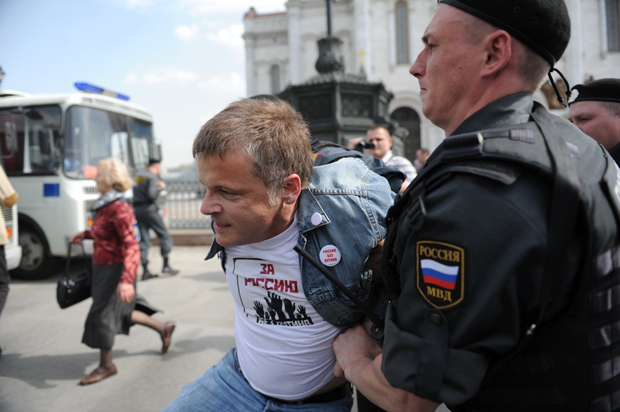
Pussy Riot supporters prevented from praying for Putin’s resignation outside the Cathedral of Christ the Saviour in Moscow (Image: Anton Belitskiy / Demotix)
Two issues preoccupying post- Soviet society are a wish to oppose outside influences (mainly from the West), and to resist aggressive behaviour in matters of religion. It is not difficult to point out inconsistencies and contradictions in these approaches, but more germane is the fact that both have survived, if in modified form, to the present day. When the possibility of further restrictions on freedom of conscience are being discussed, a key topic is invariably the need to protect society from the “expansionism” of new religious movements and radical Islam.
The arrests of members of the Pussy Riot punk band after their performance outside Moscow’s Cathedral of Christ the Saviour proved a powerful catalyst for both these concerns. The protest was seen as a frontal attack on “tradition” by “pro-Western forces” (the actual point Pussy Riot wanted to make was neither here nor there), and as an attack on the religious sensibilities of the “Orthodox majority”. The reaction was accordingly heavy-handed, including not only imprisonment of two members of the group, but also the passing of a law criminalising the “offending of believers’ religious sensibilities”, often referred to as the “blasphemy” law.
The legislative proposal was introduced in September 2012 and became law in August 2013 but has not yet been enforced anywhere. There may be at least two reasons for this. First, many laws that are aimed at NGOs, protesters or what is seen as the “opposition” have either been applied much less rigorously than expected or not at all. The authorities have chosen not to resort to wholesale repression, preferring intimidation. Second, the Russian state and its political elite are still very secular and feel uncomfortable about what is widely regarded as a law against blasphemy.
Strictly speaking, this is not a law against blasphemy, unlike, for example, similar legislation in Italy. The offence is not against religious doctrine, the deity, or things considered holy. Desecration of sacred objects is an offence not under the Russian Criminal Code, but under the code of administrative offences, which means it is seen as less serious. Offending religious sensibilities or beliefs is a crime in the penal codes of several European countries, but the European Court of Human Rights (and, following it, the Parliamentary Assembly of the Council of Europe) has consistently confirmed that a distinction needs to be made between offending sensibilities and inciting hatred.
In Russia today there are still attempts to bring charges of incitement to hatred under Article 282 of the criminal code in incidents that the law enforcement agencies, victims or others might reasonably have been expected to regard as mere offences against religious sensibilities. In a few cases, charges have been brought and, in fewer still, these charges have led to convictions. From interviews with law enforcement officers and representatives of various religious organisations, it is evident that numerous individuals and organisations that feel they have been offended on religious grounds appeal to the police and prosecutor’s office to institute criminal proceedings under Article 282. These requests are almost invariably turned down, and this is not a matter of officials taking sides: they are simply reluctant to institute proceedings on a shaky legal basis, except when that is in their own self-interest. They will do so if there is pressure on them from above, or if they face a pressing need to meet some target.
The addition of this new article to the criminal code, if it is not repealed, will lead sooner or later to its being enforced, and the main source of litigation will be complaints from numerous indignant parties. Demands for charges to be brought rained down upon the prosecutor’s office and police even before the amendments became law. It is important to recognise that the problem is not only repressive intentions on the part of the authorities, but also the repressive instincts of Russian citizens. Representatives of a wide range of community interest groups (though, thankfully, by no means all), including a number of minorities, constantly demand that criminal prosecution be the main way to influence those who cause them offence.
If the system does start enforcing this law, freedom of conscience will come under immense new pressure because of the likelihood of the sheer volume of litigation. Enforcement is likely to be highly selective, because a law of this kind can only be applied selectively. It will be manifestly discriminatory, in accordance with some individuals’ personal preferences and depending on the government’s latest priorities. Finally, it will be completely chaotic, because complaints will come in from all directions and there is nobody remotely qualified to assess their merits.
We can hope, of course, that the new article may yet be removed from the criminal code, but the chances of that are slim. The fact that it is there in the first place results from a consistent trend towards restricting freedom of expression in matters of religion, justified on the basis of the need to maintain “religious peace”. There are two main aspects to this laudable aim, and they enjoy widespread support. The first is safeguarding national security against the preaching of terrorism motivated by religion. The second is to safeguard national security against internal, particularly ethnic, conflicts, which are seen as often being fuelled by religion.
These two security aspects were major reasons for the introduction, in 2002-2007, of the current legislation to counteract “extremism”. This legislation is used extensively against violent racist groups, but also against sundry ideological minorities, which by no means espouse violence or pose a serious, or indeed any, threat to national security.
Abuse of this legislation is made possible by its imprecise wording, which we also find in respect to the new law to protect religious sensibilities. This inevitably leads to arbitrary application and, specifically, to exploitation for political purposes. There have been numerous instances of this, but let us focus on just three. Among the first major “anti-extremist” trials associated with religion were those targeting contemporary art exhibitions at the Andrey Sakharov Museum, which presaged the Pussy Riot case. Also, in 2011, a journalist was convicted for making rude remarks about believers in general, and the clergy in particular, even though his was not by any means a high profile protest and could not be represented as involving incitement to hatred against any group. Lastly, over several years there has been a serious campaign of criminal prosecution against people who read or distribute the works of a Sufi teacher, the late Said Nursi, even though neither he nor his Russian followers have links to terrorism, or engage in conduct which might constitute a threat to society.
In the case of the Sakharov museum exhibitions, the general public could at least understand more clearly what was going on. Some might consider the exhibition a profound artistic meditation on relations between the church and society; others might see the exhibits as an amusing send-up of the church and/or orthodoxy; some might consider it a send-up in bad taste or even an attack on the church, but within acceptable limits of freedom of expression; others, however, were determined to prove that the exhibition was a criminal incitement to hatred of orthodoxy and Orthodox Christians.
In the case of the persecution of followers of Said Nursi, the general public know nothing about the subject and must either just believe or disbelieve what they are told by the security services, believe or disbelieve what is said by Muslim leaders defending those being persecuted, or simply turn and look the other way. Most people choose the last option, including a majority of journalists,which means a majority of citizens, even those who take an interest in social matters, know nothing about these prosecutions.
Our citizens’ understanding of the issues around freedom of conscience is fragmentary. Most are far more concerned about conflicts over the balance between the slow-but-sure process of de-secularisation and the constitutionally guaranteed secular nature of the state. There are controversies over the presence of religion in schools, about the erection of Orthodox churches and mosques (although in the case of mosques the main cause of dissension is racism), and about various symbols of the cosy relationship between church and state. The real-life problems facing religious groups and, more generally, people expressing an opinion about religion, get forgotten.
These problems are legion. The most acute in recent years have arisen from improper application of anti-extremism legislation, but there are also the more “ordinary” problems, like refusals to release building land for places of worship and systematic campaigns of defamation. In a number of cases, like that of the Jehovah’s Witnesses, all these problems come together.
The Federal List of Extremist Materials has, however, excited the public’s interest by its scale and, even by Russian standards, sheer absurdity. The list can be found on the website of the Ministry of Justice and itemises materials banned from mass circulation. The ban is imposed by courts at the insistence of local prosecutors, who must satisfy the court that the material contains elements that can be construed as constituting “extremist activity”. This is usually incitement to hatred of some sort, impugning the dignity of a group, asserting the superiority or inferiority of a particular religion, and so forth. The whole process is quite remarkably ineffective and does not stand up to scrutiny. Most of the materials the list is seeking to ban cannot be identified from the titles given and, no less problematically, banning them does not in strictly legal terms mean they cannot be re-published, because a new court case would be needed to re-establish the identity of the materials.
A great many of the banned books, websites, videos and material involves religion in one way or another. Many are jihadist texts openly calling for terrorism or other forms of violence, but many have nothing prejudicial in them: perhaps at most a claim of the superiority of one set of beliefs over others, to which texts of Jehovah’s Witnesses are prone. There are works by Muslim authors well known for their contribution to jihadist ideology, but on topics that are of no concern to national security (most commonly, on aspects of Sharia law). Finally, a number of texts have found their way on to the list purely by chance, having been confiscated from some “wrong-thinking” individual. This explains the presence of medieval treatises by the likes of the Persian mystic al Ghazali. In 2013 there was even a ban imposed on one of the most popular translations of the Quran.
The absurdity of such methods of “fighting extremism” has obliged even President Putin, at a recent meeting with muftis in Ufa in Bashkortostan, to acknowledge that there are problems with the current approach to banning religious materials. Alas, there is no sign of willingness to review the methods of fighting extremism more generally, or those aspects of them that most blatantly violate freedom of conscience.
Translated by Arch Tait
This article appears in the Winter 2013 issue of Index on Censorship magazine.
14 Jan 2014 | News, Russia
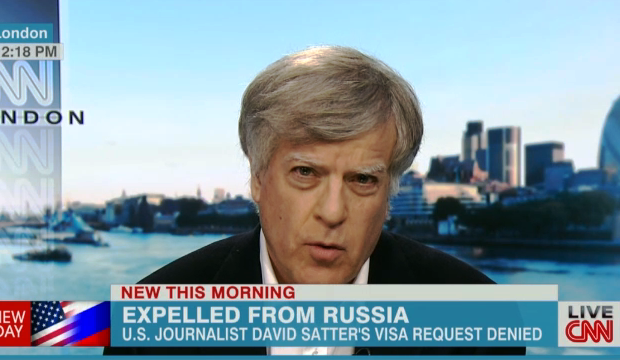
Fielding calls in the back of a London black cab, American journalist David Satter is a busy man.
Satter, who has reported on Soviet and Russian affairs for nearly four decades, was appointed an adviser to US government-funded Radio Liberty in May 2013. In September, he moved to Moscow. But at Christmas, he was informed he was no longer welcome in the country — the first time this has happened to an American reporter since the cold war.
Since Monday night, when the news of his expulsion from Russia broke, he’s been talking pretty much non stop, attempting to explain the manoeuvres which led to him being exiled from his Moscow home.
A statement issued by the Russian foreign ministry claims that Satter had violated Russian law by entering the country on 21 November, but not applying for a visa until 26 November.
Satter dismisses this as “nonsense”, saying he had been assured that a visa that had expired on 21 November would be renewed the following day, with no gap. As it happened, the visa was not renewed on time, “in order to create a pretext”, he tells Index.
To cut a short cut through a labyrinthine tale of bureaucracy: Satter says he left Russia in order to gain a new entry visa, which he could then exchange for a residency visa as an accredited correspondent for Radio Liberty.
He was repeatedly told this visa had been secured. Eventually, on 25 December, he was told that he had a number for a visa, but not the necessary invitation to accompany it. “Kafkaesque”, he calls it. The embassy official had never heard of this happening before. And, as Satter points out, he would not have been issued a number for a new visa in December if it had not been approved.
Eventually, he was told to speak to an official named as Alexei Gruby, who told him that “the competent organs” (code, Satter says, for the FSB) had decided that his presence in Russia was not desirable, language normally reserved for spies. “And now we see I have been barred for five years.”
“The point is, I urge you not to get caught up in their bureaucratic intrigues…the real reason was given to me, in Kiev, on 25 December.”
Is this just another example of FSB muscle flexing?
“Possibly. I’ve known them for a number of years, and I can’t always understand what they’re doing. Usually what they do is not very good…”
This is not Satter’s first brush with the Russian secret services. In a long career with the Financial Times, Radio Liberty and other outlets, he has experience of the KGB and its sucessor. “In 1979, they tried to expel me, accusing me of hooliganism. They once organised a provocation in one of the Baltic republics in which they posed as dissidents. I spent a couple of days with them, thinking I was with dissidents – I was really with the KGB. It’s a long history. It’s in my movie. We showed it in the Maidan [December’s anti-government protests in Ukraine]. Maybe they didn’t like that.”
Satter’s film, the Age of Delirium, is an account of the fall of the Soviet Union.
Is this expulsion a personal thing? Or a move against Radio Liberty? “It’s hard to say whether it’s me, or Radio Liberty, or both.”
Satter is concerned at leaving behind research materials and belongings in Moscow, saying it is likely his son, a London-based journalist, will have to go to Russia to collect them “unless they reverse their decision, which I hope they do”.
In spite of the recent amnesty that saw Pussy Riot’s Nadezhda Tolokonnikova and Maria Alyokhina released from prison, as well as opposition figure Mikhail Khodorkovsky, the diagnosis for free speech in Russia is not good. Alyokhina dismissed her release as a “hoax”, designed to prove Putin’s power. Meanwhile, state broadcaster RIA Novosti has been dissolved and reimagined as “Rossia Segodnya” (“Russia Today” – no coincidence it bears the same name as the notorious English language propaganda station), with many fearing closer Kremlin control.
One Russian journalist I spoke to felt that, ahead of the Sochi games, the expulsion of Satter is a message to all journalists: no matter how experienced, well-known, and well-supported you are, you are still at the mercy of the authorities.
This article was posted on 14 Jan 2014 at indexoncensorship.org
20 Dec 2013 | News, Politics and Society, Ukraine
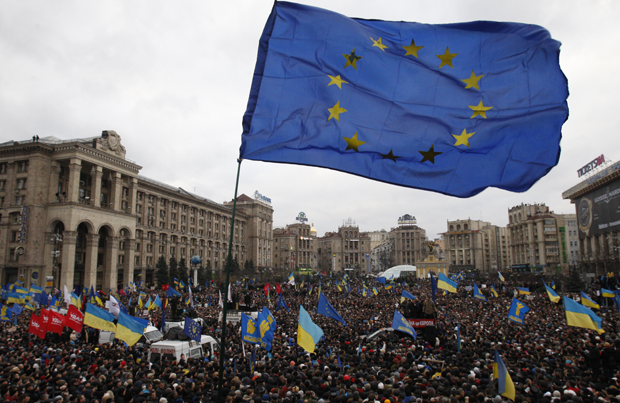
(Photo: Anatolii Stepanov / Demotix)
The coverage of Ukrainian protests in the Russian media suggests a centralised anti-EU message and has provoked outrage in Kiev.
At first, Russian TV channels appeared to broadcast inaccuracies only on the numbers taking part in the demonstrations. Despite clear evidence on the ground that tens of thousands or even hundreds of thousands were taking part, Russian reporters described scenes as “a few hundred protesters.”
Russia’s state-run First Channel then chose to dramatise Ukraine’s alleged descent into anarchy with a montage depicting combat scenes from Yugoslavia in the early 1990s, accompanied by a morbid musical soundtrack.
Komsomolskaya Pravda, a popular Russian daily, led on Tuesday with “Ukraine may split into several parts” with an illustrative map to depict the predicted chaos. The next day, a headline read “Western Ukraine is preparing for civil war.”
Overall – the message from the state-controlled Russian media seems to have been – “Ukraine is suffering at the fate of dangerous opposition militants.”
Putin has lent his weight to the propaganda, describing unrest in Kiev as “more of a pogrom than a revolution” and calling protesters “well-prepared and trained militant groups.”
“Ukraine is like a liner going in a circle,” commented a high-profile Russian journalist this week. “The passengers are calmed by the fact that Europe is near, there is not far to go. In reality the economic collapse of the whole country lies ahead…Passengers will be hurt. Some will not survive.”
The journalist quoted is Dmitry Kiselyov, who Vladimir Putin recently named as head of a re-launched Russia Today — as part of the take-over of previous state broadcaster RIA Novosti.
The shutdown of RIA Novosti was seen as a further degradation in the impartiality of the Russian media — despite being state-owned it had offered some balanced reporting on Russian domestic and foreign policy.
Media analysts in Russia have commented that Kiseylov’s appointment to Russia Today, now the sole government news agency, may have derived from his loyal allegiance to Putin and his ability to propagandise in his favour.
In support of recent anti-homosexual legislation passed by the Russian government, Kiselyov had commented.
“Fining gays is not sufficient -– they should not be allowed to give blood, or sperm and in case of a car accident, their hearts should be burnt or buried as useless”
Kiselyov’s assessment on Maidan went further than his dubious ship analogy — suggesting on his weekly TV show that Sweden, Lithuania and Poland may be manipulating events behind the scenes as revenge for a battle the Russians won in the early 18th century, a battle that happened to be fought in present-day Ukraine.
“It looked like thirst for revenge for Poltava,” argued Kiseylov, citing the name of a battle that took place in 1709.
He then labelled Ukrainian opposition leader and boxer Vitali Klitschko, and his brother Vladimir, as “gay icons,” before describing the “ancient African military techniques,” which the protesters were apparently employing.
He also accused protesters of aggressively firing tear gas at police (when multiple Ukrainian and European media sources confirmed the opposite was correct), and said that opposition leaders had brought students to the protest as sacrificial lambs for the security forces. In fact, police had gone out and savagely beaten groups of students hours before.
Finally, he describes the “writers” of the revolution as a Ukrainian-American-European conspiracy, against Russia.
Skewed Russian coverage has not gone unnoticed in Ukraine. A journalist interrupted a live broadcast from Rossiya 24 – handing over a fake “Oscar” statue in recognition of the “lies and nonsense” that was being reported.
Before being pushed off frame, the Ukrainain Vitaly Sedyuk was able to blurt out “We love Russians but after the way you covered events….”
The Russian reporter ended his piece still holding the fake Oscar statue in his hand.
In contrast to relatively objective reporting in Ukraine, the reporting of Kiseylov and other Russians, combined with a media landscape which has now lost most of its independent voices, indicates the strongest move yet towards total state control of the Russian media.
This article was published on 20 Dec, 2013 at indexoncensorship.org
13 Dec 2013 | Europe and Central Asia, News, Russia
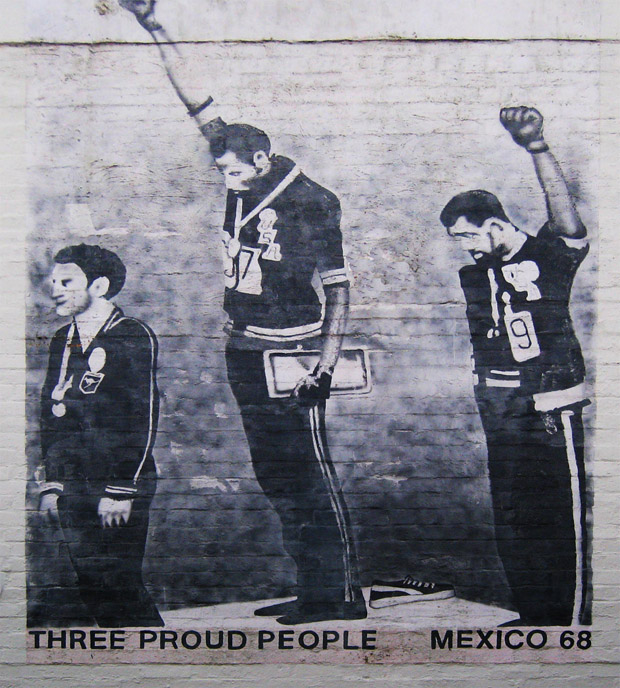
Grafitti of Tommie Smith, John Carlos and Peter Norman showing solidarity for the civil rights movement at the Mexico City Olympics in 1968 (Image: Newtown graffiti/Wikimedia Commons)
Athletes preparing to head off to Sochi Winter Olympics in February, have been reminded that they are barred from making political statements during the games.
”We will give the background of the Rule 50, explaining the interpretation of the Rule 50 to make the athletes aware and to assure them that the athletes will be protected,” said IOC President Thomas Bach in an interview earlier this week. Rule 50 stipulates that ”No kind of demonstration or political, religious or racial propaganda is permitted in any Olympic sites, venues or other areas.” Failure to comply could, at worst, mean expulsion for the athlete in question.
Political expression is certainly a hot topic at Sochi 2014. The games continue to be marred by widespread, international criticism of Russia’s human — and particularly LGBT– rights record. The outrage has especially been directed at the country’s recently implemented, draconian anti-gay law. Put place to “protect children”, it bans “gay propaganda”. This vague terminology could technically include anything from a ten meter rainbow flag to a tiny rainbow pin, and there have already been arrests under the new legislation.
The confusion continued as the world wondered how this might impact LGBT athletes and spectators, or those wishing to show solidarity with them. Russian authorities have for instance warned of possible fines for visitors displaying “gay propaganda”. Could this put the Germans, with their colourful official gear, in the firing line? (Disclaimer: team Germany has denied that the outfits were designed as a protest.)
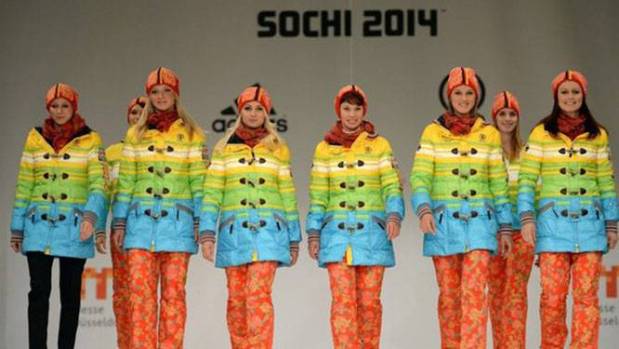
On the other hand, Russian president Vladimir Putin has promised there will be no discrimination at the Olympics, and IOC Chief Jaques Rogge, has said they “have received strong written reassurances from Russia that everyone will be welcome in Sochi regardless of their sexual orientation.”
On top of this, the IOC also recently announced that there will be designated “protest zones” in Sochi, for “people who want to express their opinion or want to demonstrate for or against something,” according to Bach. Where these would be located, or exactly how they would work, was not explained.
But while the legal situation in Russia adds another level of uncertainty and confusion regarding free, political expression for athletes, rule 50 has banned it for years. And for years, athletes have taken a stand anyway.
By far the most famous example came during the 1968 Olympics in Mexico City — American sprinters Tommie Smith and John Carlos, on the podium, black gloved fists raised in solidarity with the ongoing American civil rights movement. The third man on the podium, Australian Peter Norman, showed his support by wearing a badge for the Olympic Project for Human Rights. All three men faced criticism at the time, but the image today stands out as one of the most iconic and powerful pieces of Olympic history.
However, the history of Olympians and political protest goes further back than that. An early example is the refusal of American shotputter Ralph Rose to dip the flag to King Edward VII at the 1908 games in London. It us unknown exactly why he did it, but one theory is that it was an act of solidarity for Irish athletes who had to compete under the British flag, as Rose and others on his team were of Irish descent.
The Cold War years unsurprisingly proved to be a popular time for athletes to put their political views across. When China withdrew from the 1960 Olympics in protest at Taiwan, then recognised by the west as the legitimate China, taking part. The IOC then asked Taiwan not to march under the name ‘Republic of China’. While considering boycotting the games, the Taiwanese delegation instead decided to march into the opening ceremony with a sign reading “under protest”.
The same year as the Smith and Carlos protest, a Czechoslovakian gymnast kept her face down during the Soviet national anthem, in protest at the brutal crackdown of the Prague Spring earlier that year. And that was not the only act of defiance against the Soviet Union. During the controversial 1980 Moscow Olympics, boycotted by a number of countries over the USSR invasion of Afghanistan, the athletes competing also took a stand. The likes of China, Puerto Rico, Denmark, France and the UK marched under the Olympic flag in the opening ceremony, and raised it in the medal ceremonies. After winning gold, and beating a Soviet opponent, Polish high jumper Wladyslaw Kozakieicz also made a now famous, symbolic protest gesture towards the Soviet crowd.
But there are also more recent examples. At Athens 2004, Iranian flyweight judo champion Arash Miresmaeili reportedly ate his way out of his weight category the day before he was set to fight Israeli Ehud Vaks. “Although I have trained for months and was in good shape, I refused to fight my Israeli opponent to sympathise with the suffering of the people of Palestine” he said. A member of the South Korean football team which beat Japan to win bronze at the 2012 London Olympics, celebrated with a flag carrying a slogan supporting South Korean sovereignty over territory Japan also claims.
When the debate on political expression comes up, the argument of “where do we draw the line” often follows. If the IOC is to allow messages of solidarity with Russia’s LGBT population, should they allow, say, a Serbian athlete speak out against Kosovan independence? Or any number of similar, controversial political issues? Is it not easier to simply have a blanket band, and leave it at that?
The problem with this is, as much as the IOC and many other would like it, the Olympics, with all their inherent symbolism, simply cannot be divorced from wider society or politics. The examples above show this. With regards to Sochi in particular, the issue is pretty straightforward — gay are human rights. Some have argued we should boycott a Olympics in a country that doesn’t respect the Universal Declaration on Human Rights, or indeed the Olympic Charter. This is not happening, so the very least we can is use the Olympics to shine a light on gay rights in Russia. At its core, the Olympics are about the athletes — they are the most visible and important people there. It remains to be seen whether any of them will take a stand for gay rights, outside cordoned-off protest areas, in the slopes and on the rink, where the spotlight shines the brightest. And if they do, they should have our full support.
This article was posted on 13 Dec 2013 at indexoncensorship.org





